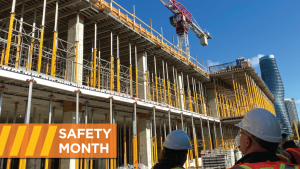The Ontario government has announced a two-phased approach to restarting apprenticeship and construction safety training in the province with non-college training providers allowed to launch in-class programs almost a month ahead of college programs.
Non-college Training Delivery Agents (TDA) such as union training centres offering apprenticeship training and pre-apprenticeship programs and health and safety training providers were allowed to launch as of June 12.
Ontario colleges and private career colleges, meanwhile, will be required to wait until July 2 to provide training for apprentices and pre-apprentices following health and safety guidelines for post-secondary institutions.
The non-college training follows rules established by the Ministry of Labour, Training and Skills Development while the colleges adhere to Ministry of Colleges and Universities guidelines, explained Minister of Labour Monte McNaughton in a June 19 interview.
“This is a benefit of having the labour and training ministry together, we were able to listen to our stakeholders and move this forward much more quickly than possibly it was going to be done,” said McNaughton. “We are able to put the focus on health and safety training and the training of apprentices together when we make decisions.”
The Ministry of Labour has calculated that about 9,000 apprentices, 300 pre-apprentices, 148,000 workers taking Working at Heights programs and over 8,000 workers taking Joint Health and Safety Committee certification training programs had training cut short by the COVID-19 emergency orders shutting down much of the province in March.
Priority in the training programs will be given to students whose training was interrupted by COVID-19.
There are 72 training providers for apprenticeship students according to ministry statistics. Each year more than 40,000 apprentices take part in in-class training across the province.
Pre-apprenticeship training programs are publicly funded, last up to one year, and often combine classroom training with an eight- to 12-week work placement.
“I am proud I was able to fast-track the reopening of union training centres and health and safety training centres in the province,” said McNaughton.
“I listened to construction employers and labour leaders and this just made sense. We know that apprenticeship takes a long time to complete and with the disruption of classes some apprentices in the early part of their term may not return.
“I wanted to get them back into the classroom as safely and as soon as possible.”
McNaughton said recruiting and training apprentices in the skilled trades remains a major focus of his ministry along with ensuring adequate sector-by-sector health and safety protocols are in place.
“Prior to COVID-19 we knew that in Ontario 200,000 jobs were going unfilled, including thousands in skilled trades. It is my commitment to fill the skills gap in Ontario. This is going to be a main focus of my ministry as we move into the recovery phase.”
There are 250 approved training providers for Working at Heights and Joint Health and Safety Committee certification training. The ministry said 58,974 workers successfully completed Joint Health and Safety Committee certification since 2016 and 821,515 workers were trained in Working at Heights since 2016.
Asked if he was confident the construction sector would have sufficient health and safety guidelines in place to enable it to withstand a second wave of COVID-19, McNaughton said he continues to work closely with workers and employers in ensuring workplaces are as safe as possible.
“I am counting on the construction industry to continue stepping up and make improvements on jobsites across the province and I am confident they will,” he said. “We have to prepare for a possible second wave and I will continue encouraging employers to take every protocol possible to ensure health and safety on jobsites.”
Since the pandemic began there have been 11,500 workplace investigations by the Ministry of Labour, 6,500 work orders and 23 workplaces shut down across province, almost all, if not all, of them in construction, McNaughton said. The ministry intends to continue bolstering inspection staff, he added.
Follow the author on Twitter @DonWall_DCN.











Recent Comments
comments for this post are closed